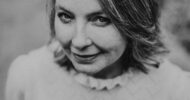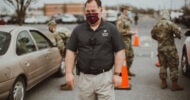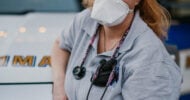Perpetually late to the game, I was watching The Crown on my laptop Friday night, the wonderful episode set in the summer of 1969, when astronauts landed on the moon. While the world gazed into the heavens, series creator Peter Morgan looked around here on Earth and asked, What does it all mean?
Contrasted against this crowning scientific achievement was the Duke of Edinburgh’s personal crisis of faith. When NASA launched, Prince Philip was entangled with his pastor, who had suggested creating a retreat center for struggling clergy on the palace grounds. This was a perfect opportunity for the prince to reignite his faith, but it was not that simple for the man who was constantly portrayed as frustrated, invisible, and redundant. I’d be lying if I suggested that it wasn’t fun watching him squirm around Buckingham Palace, shouting to a family that didn’t seem to care. Again.
This particular episode got me thinking about my childhood, which was also in the shadow of the moon landing and all the possibilities it offered. Born in 1976, a mere seven years after Apollo 11 touched down on the powdery lunar surface, my youth was distinctly in the chemtrails of NASA rocketry. On April 12, 1981, a three-rocket system sent the Space Shuttle into orbit and, in the process, likely launched me into science.
The astronauts—all of them—were likely in Friedrich Nietzsche’s dreams when he coined the term Übermensch in 1883. I had no knowledge in my youth about that word’s meaning, but, make no mistake, I knew who these people were. These were brilliant, capable, courageous people—astronauts. I idolized them all, and they set an unattainable standard. The best of us, they were practically extraterrestrial. Were they even real?
I didn’t see a true place for myself in science, that is until Gary Larson and his bonkers-genius creation, The Far Side, came into my life. Contained within the single frames, Larson captured life’s absurdity, but it was the images of scientists that spoke to me the loudest. These “regular” scientists—bespectacled, often confused, sometimes overweight and in peril—offered an easy on-ramp to join their tribe. They were the opposite of the chiseled, brave, space-going NASA crews. Many people in my life seemed to be featured in The Far Side, which only gave Larson more credibility as a legitimate oracle.
By the time I was in elementary school, my unusual abilities meant that I regularly turned the heads of teachers, many of whom looked at me like I was different, special. I loved many subjects, but it was math and science that pulled me into my own orbit, one that ultimately led to health care. All the while, The Far Side had opened a portal into my future, one where regular folks lived and worked. I envisioned myself as a character in the cartoon, doing research and having a life of intellectual adventure. I didn’t have such a space as a child, but the idea that this world existed—somewhere—provided a North Star to gaze upon.
Where do I even begin to describe the inspiration Larson provided me? Pranks with hydrochloric acid in the chemistry lab. Doing research on cardboard armor in the Middle Ages. Scientists in white coats running away from a blackboard full of equations—because an ice cream truck is on the street! An anthropologist simultaneously holding hands with a beautiful woman and an ancient skull, smiling as if all of his dreams had come true at once.
Prince Philip and I lived lives that could not have been more different. But as I watched him inspired, struck speechless by humans landing on the moon, I felt a kinship. I, too, felt my spirit soar when the Space Shuttle launched into the sky and took the very best humans with it. Meanwhile, back here on Earth, I grew increasingly confident that a regular human being like me would be welcome in the world of science. And once I got there, I fully expected mischief, fun, and maybe insights into what was on the other side of the universe.
Ryan McCarthy is an internal medicine physician.























![Ecovillages and organic farming could reverse global warming [PODCAST]](https://kevinmd.com/wp-content/uploads/The-Podcast-by-KevinMD-WideScreen-3000-px-3-190x100.jpg)
![Teaching joy transforms the future of medical practice [PODCAST]](https://kevinmd.com/wp-content/uploads/Design-1-1-190x100.jpg)
